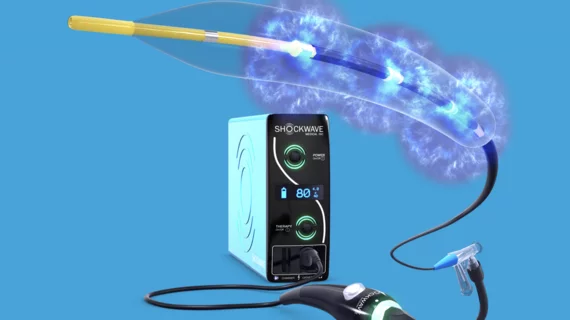Is IVL equally effective in male and female patients? Shockwave Medical aims to find out with a historic new study
Shockwave Medical has announced a new clinical trial focused on the safety and effectiveness of its intravascular lithotripsy (IVL) technology in female patients with symptomatic ischemic heart disease. While prior studies have included both male and female patients, Shockwave wanted to separately confirm that IVL makes sense as a frontline strategy when female patients present with complex calcified coronary lesions.
The company shared news of this new real-world analysis with attendees at TCT 2022 in Boston. The EMPOWER CAD study is expected to enroll up to 400 patients, tracking each one for three years after treatment with the Shockwave C2 Coronary IVL Catheter. According to Shockwave, it is the first prospective coronary intervention study ever to only include female patients.
“When it comes to coronary artery disease (CAD), females are often under-investigated, under-treated and have less favorable outcomes than males due to a variety of different factors,” co-principal investigator Margaret McEntegart, MD, PhD, director of the complex percutaneous coronary intervention program at Columbia University Medical Center/New York-Presbyterian Hospital, said in a prepared statement. “Previous reports with atherectomy have shown that females with calcified CAD are more susceptible to adverse procedural outcomes compared to males. Despite often being more challenging to treat, female patients are under-represented in published data, and there have been no dedicated prospective studies performed on this population. EMPOWER CAD will be an extremely valuable study to better inform interventional cardiologists on the optimal treatment strategy for these complex patients.”
“Early retrospective analyses have suggested that coronary IVL can potentially bridge the disparity in clinical outcomes between sexes, however the studies only included a limited number of females with strict inclusion criteria,” added co-principal investigator Alexandra Lansky, MD, professor of medicine at Yale University School of Medicine. “Information that will be gathered in EMPOWER CAD will be immensely valuable, as it will provide more robust data with longer-term outcomes in a larger, all-comers patient cohort to determine whether coronary IVL should be considered the front-line calcium modification approach in female patients.”
Keith D. Dawkins, MD, Shockwave’s chief medical officer, said this new study highlights the company’s commitment to closing the significant gap in care between male and female CAD patients.
“We hope to enhance the clinical evidence with this new study while also taking the opportunity to work with some of the leading female interventionalists in the community, which will empower future generations of clinical trial investigators,” he said in the same statement.
Click here for more news out of TCT 2022.

